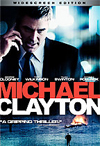2008
Main Movie
Page
Atonement
Boy in the Striped Pajamas
Brideshead Revisited
Counterfeiters
The Dark Knight
Enchanted
Frozen River
Indiana Jones and the Kingdom of the Crystal Skull
Iron Man
Juno
Man on Wire
Michael Clayton
No Country
for Old Men
Rachel Getting Married
the Savages
The Secret Life of Bees
Sweeney Todd
There Will Be Blood
The Visitor
WALL-E
Film
Reviews from 2007
Film Reviews
from 2006
Michael Clayton stars George Clooney as a self-described “fixer,” a troubleshooter, even a “miracle worker” for a large New York law firm. When no one else can get a job done, they send for Michael Clayton who will do whatever he can to win a case for his firm. Michael seldom thinks about the consequences of what he does. He just does his job and moves on to the next. Michael has been working with his friend Arthur (Tom Wilkinson), a brilliant lawyer who is defending U-North, a global bio-ecological firm, against a class action law suit. Arthur learns the truth, that U-North knew years ago the potentially harmful effects of their chemicals, yet did nothing to warn anyone. Arthur flips out during a deposition, and begins to take all his clothes off. Of course, Michael is called in to “fix” the situation. The more he delves into the case, the more he finds that Arthur’s response may not have been so crazy after all.
The best scenes are two character scenes between Michael and Arthur, and Michael and Karen. Michael tries desperately to reach out to Arthur, then begins to learn that Arthur was on to something. And the final scene when Michael confronts Karen is great stuff. Clooney shines in these scenes, and I would not be at all surprised to see him and co-stars Wilkinson and Swinton, both of whom are outstanding, receive Oscar nominations for their work. For all these reasons, I recommend Michael Clayton, even though it is flawed. When the film is focused on Michael, Bill, and Sally, it’s absorbing and intense. However, writer-director Tony Gilroy (known for adapting the three Bourne films for the screen) loses the dramatic intensity when he shifts the focus to Michael’s relationship with his family. Scenes with divorced father Michael and his son are nice, but don’t add anything to the picture. Furthermore, scenes with Michael interacting with his father and brothers (one a cop, the other a recovering addict), needlessly confound the plot. I assume the scenes are intended to show Michael as a decent man, from humble beginnings, trying to deal with his family. Instead, they detract from the film’s major focus. In addition, the structure of the film, moving backward and forward in time, does not help. I think a more straightforward telling of the story, focusing on lead actors Clooney, Wilkinson, and Swinton, would have tightened the focus and made for a better film. In conclusion, I recommend Michael Clayton. Despite my reservations, it’s a thought-provoking tale of a contemporary crisis of conscience in which truth and justice become entangled with company loyalty and enormous amounts of money. It’s as relevant as the morning newspaper.
|
"Despite
my reservations, it’s a thought-provoking
tale of a contemporary crisis of conscience..." The USCCB Office for Film & Broadcasting classification is A-III -- adults. The Motion Picture Association of America rating is R -- restricted. Under 17 requires accompanying parent or adult guardian. |
subscribe to
DomLife.org and receive a free email update every two weeks. unsubscribe |



 Michael Clayton
Michael Clayton At its best, Michael Clayton is a smart, well acted, great
looking movie about a matter of conscience. What is Michael to
do when he learns the truth? What happens when so much money, and
the reputation of the firm, is at stake? The stakes are very high
here. It’s also a thriller, as Karen (Tilda Swinton,) U-Tube’s
chief legal consultant, hires thugs to follow both Arthur and Michael.
At its best, Michael Clayton is a smart, well acted, great
looking movie about a matter of conscience. What is Michael to
do when he learns the truth? What happens when so much money, and
the reputation of the firm, is at stake? The stakes are very high
here. It’s also a thriller, as Karen (Tilda Swinton,) U-Tube’s
chief legal consultant, hires thugs to follow both Arthur and Michael.